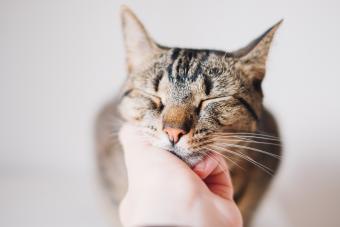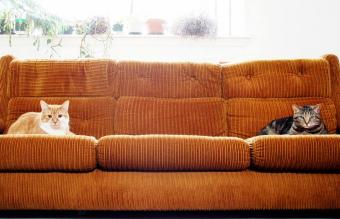
Do cats get depressed? Cats are known to be mysterious and difficult to read. Fortunately, there are some hints that may tell you they're feeling off. Professionals and cat lovers both believe cats could experience depression, especially during certain events. But no matter what, it's important to bring them back to normal as quickly as possible for their mental and physical well-being.
Do Cats Get Depressed?
According to Autumn Trails Vet, "Cats, like humans, can suffer from mental exhaustion, depression, and anxiety. The reasons for these conditions can be illness, injury, pain, or the loss of a companion. Whatever the reasons are, the symptoms are usually the same."
Signs of Depression in Cats

As a responsible pet parent, it's important to notice when your cat's behavior deviates from its normal patterns. Familiarizing yourself with how your cat usually acts can help you identify any abnormal behaviors that could be a red flag.
Jot down anything out of the ordinary as soon as you notice it, and keep a log over the next few days. It will help you track behavior changes.
1. You Might Notice More Vocalizations
When cats are having a hard time, they may begin to meow or cry more than they normally do. They might purr more as a way to make themselves feel better — commonly known as "self-soothing." Plus, if a usually quiet cat starts being noisy out of nowhere, it could be a sign that they're stressed or anxious.
Lakeland Animal Clinic says, "If your cat is meowing non-stop, and this is a new behavior, then you will want to do a thorough checkup with your veterinarian. There are many diseases that can cause your cat to feel hungry, thirsty, or in pain."
2. Their Body Language Will Tell You
When cats feel depressed, they show it with their body language. You might see their ears go back, their tails curl up, and their fur stand up, which shows they're not feeling great. It's really important to pay attention to these signs, because they tell us how a cat is feeling inside. By learning to read these body language cues, you can figure out what your cat is trying to say and help make them feel better.
Related: 10 Weird Cat Behaviors, Explained
3. They Could Be Overly Clingy or Abnormally Distant
If your cat is feeling sad or depressed, you might notice them wanting more of your attention and becoming more clingy than usual. Or if they're usually shy around people, their nervousness around others can get worse when they're not feeling happy. Also, a cat that's feeling down might not want to do things they usually enjoy, like playing with their housemates, looking for treats, watching critters on TV, or chasing after their favorite mouse toy.
When they start pulling away from these activities, it's a sign they probably need some extra care and support.
4. There Could Be Changes in Their Sleep Habits
According to Fear Free Happy Homes, "In a paper studying animal sleep times, adult cats averaged 10 to 13 hours of sleep a day, which equals about two-thirds of their lives. Just as sleep requirements vary in humans, some cats may sleep more, close to 20 hours, while others sleep less." If you notice your cat is sleeping significantly more or less than their norm, there could be something to worry about.
Check out our article on sleeping positions to discover what your kitty's sleeping position is silently sharing.
5. You Notice Appetite Changes
When a cat feels depressed, they might start to eat less or even stop eating altogether. Cats that are feeling down might ignore foods they used to like and might not even want their favorite snacks. Tufts University Clinical Nutrition Service warned, "When a cat doesn’t eat enough food for multiple days to weeks ... his body starts using fat for energy. If food isn’t provided in time, the fat can overwhelm the cat’s ability to break it down. The fat will then build up in the liver until it causes serious liver disease."
6. Your Cat Pees in the Wrong Places
Like our dogs, cats may seem to forget all the rules of housetraining if they get depressed. According to the ASPCA, "Cats sometimes stop using their litter boxes when they feel stressed. Identify and, if possible, eliminate any sources of stress or frustration in your cat’s environment."
7. Their Coat Might Look Scraggly
Our cats are usually really good at taking care of their coats, but if your cat is depressed, they might not be up to it. If you think about it, this one really makes sense. If you're down in the dumps, do you feel up to making yourself shiny? If you're like me, you probably know it will make you feel better, but I'm just not up to it on rough days, and your cat may feel the same way.
How to Cheer Your Cat Up

Before you take any steps in the behavior direction, it's crucial to visit the vet to rule out any underlying illnesses. Even though my animal behavior background involves dogs, I know my colleagues who handle feline behavior follow the same guidelines I do — they will not review your behavior case unless you have the medical side examined first to make sure your kitty is healthy.
Your vet may also recommend a different route than going to a behaviorist, which may include anti-anxiety medication rather than behavior modification.
1. Follow a Routine
Sploot Veterinary Care explains that "cats may appear to be free spirits, but they thrive on routine and structure. In fact, each cat may have individual daily routines consisting of ‘hunting’, eating, grooming, and sleeping." You don't need a strict routine, but something general is helpful not only for your kitty but also for your family, other pets, and even you.
2. Set Time Aside for Play
A depressed cat may not want to play, but it's worth the effort to try to engage with them. Even if they don't play, the engagement could be beneficial. All About Pets Veterinary Hospital recommends you "try out some new interactive toys and games" to spark your kitty's interest.
3. Don't Forget to Give Love
If your cat isn't feeling up to being lovey dovey, don't be offended. But if you approach them and they seem even the slightest bit interested, giving them some good pets could help.
4. Add Goodies to Their Food Bowl
When cats are feeling depressed, like us and our dogs, they might not want to eat, or they may eat very little. To encourage them to eat, grab some tuna in water or sodium-free chicken broth to add to their dish. On top of being delicious (to our kitties, anyway), it could add some much-needed hydration.
Visit the Vet When You're Concerned
Ultimately, even if you've already been to the vet once, if your cat doesn't seem to be improving, a visit to the vet is necessary. If the vet believes your kitty's depression can be managed without medication, you can then move on to helping them at home or with the assistance of a behavior professional.







